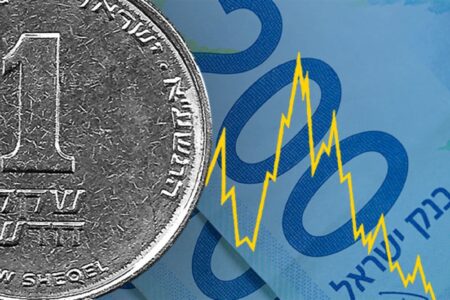The shekel fell sharply against the US dollar and the euro on Tuesday on fears of a war in the north after a Hezbollah rocket killed 12 children in Majdal Shams on Saturday. In afternoon interbank trading, the shekel was up 1.59% against the dollar at NIS 3.739/USD and 1.50% against the euro at 4.053/EUR.
The Bank of Israel set the shekel-dollar exchange rate on Friday at 3.680 shekels/dollar, up 0.739%, and the shekel-euro exchange rate at 3.993 shekels/euro, up 0.721%.
Kobi Levy, head of market strategy at Bank Leumi, told Globes that over the past week, “there has been a deterioration in local sentiment, compared to the optimism that prevailed in the market in the two weeks prior. This is in the wake of the serious attack on Majdal Shams and the growing fear of a violent response, the prolongation of the negotiations over the hostage deal and the cancellation of the Wizz deal.” Levy believes that the effects will lead to a continued decline in the value of the shekel.
Levy explains that the situation in the north “increases fears, uncertainty and market volatility. The fluctuations in the main scenario will lead to continued fluctuations in the dollar/shekel exchange rate between 3.6 shekels and 3.8 shekels to the dollar, as we have seen over the past eight months.”
“After the initial shock, the possibility of a decline depends on the nature of the Israeli response and its consequences, with the market taking advantage of the currency devaluation to convert to foreign currencies,” Yossi Freiman, CEO of Prico Risk Management, Finance and Investments, told Globes.
Levy still believes in the strength of the shekel. “The data on trade and services exports indicate a continued surplus in the current account, and the data on financial activity indicate that the current inflow of foreign investment is mainly due to temporary factors and does not indicate a fundamental change in the market. Therefore, looking ahead, in the long term, and after the negative sentiment subsides, we can expect the Israeli currency to appreciate.”
Regarding the impact of the declines in the US on the Israeli foreign exchange market, Levy believes that unlike in the past, no unusual reaction is expected. “Institutional entities have increased their liquidity balances and their exposure to foreign exchange in the past 18 months, and thus the inverse relationship between the markets and the shekel has weakened,” Levy says, adding that in order to see a change in the situation, a greater rate of declines on Wall Street is needed.
Freiman points out that in early August, we are seeing activity by Israeli exporters in the forex market: “Exporters will contribute to the supply of currency in the market and reduce the downward pressure on the shekel.”
This article was published in Globes, Israeli Business News – en.globes.co.il – on July 29, 2024.
© Copyright Globes Publisher Itonut (1983) Ltd., 2024.
